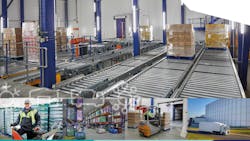Experts discuss U.K. cold storage industry’s energy transformation
A new report from the U.K.-based Cold Chain Federation (CCF) outlines how temperature-controlled warehouses could evolve to drive energy transformation in the United Kingdom, as part of the transition toward a net-zero economy.
The report, ‘The Cold Store of 2050: Maximizing Efficiency to Reduce Emissions & Drive Energy Transformation,’ was introduced during a recent webinar featuring a panel of cold-chain experts, including Dr. Alan Foster of London South Bank University, Jon Wyllie of Harlaxton Engineering Services, CCF’s Shane Brennan, and David Wallace of Star Refrigeration. The new Cold Store report is the fourth issued in the temperature-controlled association’s five-part Cold Chain Net Zero Project, which aims to bring the industry together to work toward the country’s 2050 decarbonization goals launched in October 2020.
“I am delighted to be contributing to this pivotal moment in today’s cold chain,” Wallace said.
During the webinar, experts discussed the European Union’s recent F-gas revision proposal, which requires refrigeration plants to phase down their usage of HFC refrigerants that contribute to global warming. Approximately 40% of cold stores still are using high GWP F-gases, CCF said, but with the possibility of a near 50% cut in F-gas quotas by 2024, the industry will urgently need to assess the impact of the new regulation.
Wallace touched on the critical point of what the EU regulation means for businesses as the industry phases down the use of the most environmentally damaging refrigerants and accelerates the take up of natural gases, such as ammonia and CO2.
The panel also looked at how data and monitoring can help drive energy efficiency in the cold chain of the future and help leaders evaluate funding models for energy efficiency projects.
“Industrial refrigeration is by far the largest single contributor to a site’s energy use,” Wallace said. “With population growth on course to hit just under 10 billion by 2050, there’ll be increased demand for cold storage, so it has never been more vital for the sector to improve efficiency and reduce cooling density.”

